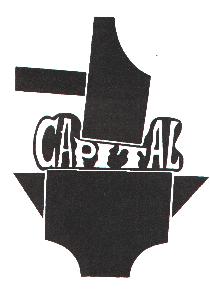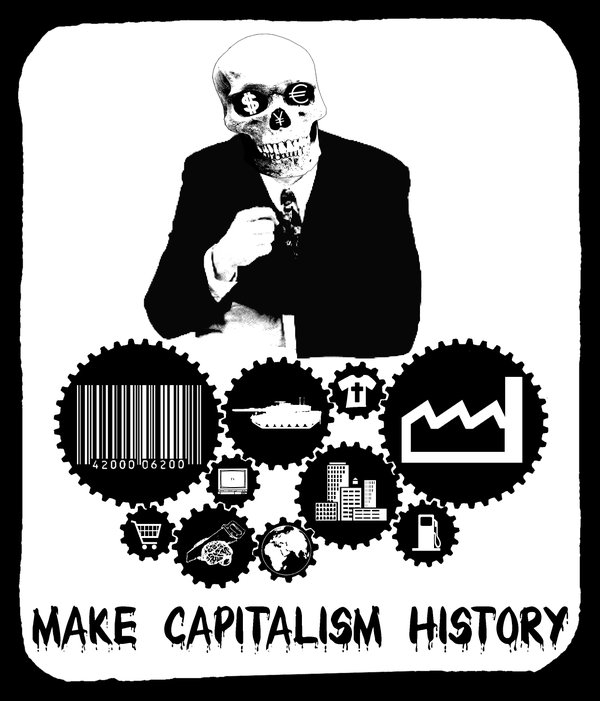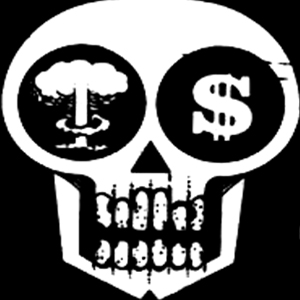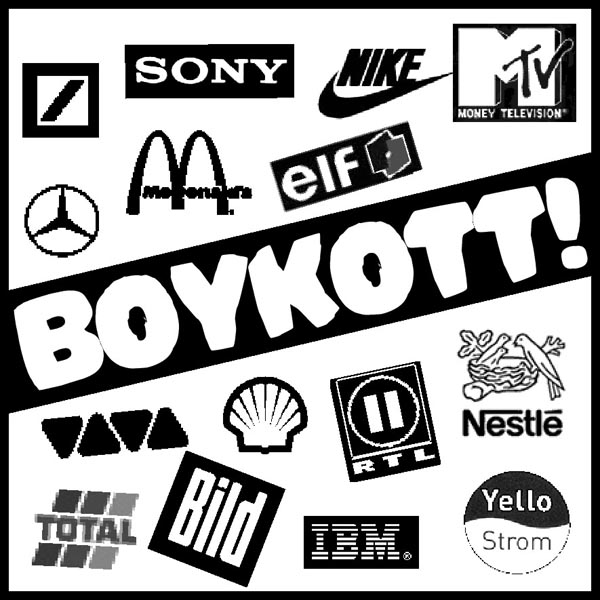|
|||||||||||||
|
the Natural Form of Resistance to Capitalism The Social Revolution is Anti-Political By Punkerslut
Capitalism is defined as a system where possession and control of society's productive instruments are owned by just a few. The rest of society, without this possession, are at the mercy of society's employers and bosses. One part of society must beg for the right to work, while the other part is fed by the work of others. One part makes up the vast majority, does all the labor, and subsists on the smallest crumbs. The other part makes up a handful, they do no labor, and they enjoy the most extravagant of wealth. This is exactly why Socialist and Leftist revolutionaries are against this type of system. Unions and political parties. One uses strike action, the other uses legal action. One is bound by the solidarity of workers, the other is composed of voters. They are the two methods that have been used to resist the abuses of Capitalism -- to resist monopoly, poverty, exploitation, and control of the government by the Capitalist class. What is the place of the union? It develops in the workplace. It is made up of the workers themselves -- those who have the most to gain by the overthrow of the Capitalist system. Those who have the most to gain by securing liberty and opportunity for every person. Those who build communities and raise families, those who live and work to make everything we enjoy. Those who have the most to gain by making theirs a universal message, a program that excludes no one. This is where the union develops, and these are the people who become its most active and dedicated members. The union, being made up of workers, can only rise up where there is a conflict between laborers and possessors -- between toilers and owners. Without such a separation, without a situation that allows for economic tyranny of the few over the many, without this injustice, the union does not come into existence. It is a form of anti-Capitalist resistance that is incubated by Capitalism. This type of peoples' movement can only emerge from an economic situation that demands it. It only comes about when the facts of daily existence demand that people acknowledge the truth of their social order, and to fight against it. The union is born from economic exploitation and it is made up of those who have been dominated by property. It fights in the workplace, by strikes and boycotts, directly striking the Capitalist at their source of power: wealth and control of the social order. In a strike, nothing gets done, and if it is wide enough, if it has enough support, it can force everything to stay at a stand-still. Strikes that are wide enough can disillusion the military and police, bringing them to mutiny. This is how the revolution was brought about in Paris in 1871 and in Russia in 1917. Political parties, though, are not born from any particular, economic conditions. They are born from a leader, who wants to gain followers to create social change through certain ideas. Workers political movements in the form of parties have existed throughout all stages of economic development. Pisistratus was an ancient Greek politician who led a successful coup in Athens in order to defend the poor laborers from the exploitation of the rich. He beat Vladimir Lenin to the idea of a Worker's State by at least two thousand years. The traditional form of the Socialist Parties were first formed in the early 1800's, and they're still being formed. But they certainly are not born out of economic conditions. The unions organize in the workplace, using the residences of its members for meetings, sometimes renting or eventually buying a hall for organizing. Communist and Socialist parties have held their meetings in shacks built from garbage and rat-infested hovels, but they have also held them in mansions and on yachts. They've been organized in student dorms and middle-class, suburban homes, sometimes in the woods to evade authorities and sometimes at their headquarters of military intelligence. Unions are born from the struggle, but political parties pop up without relation to the struggle. Parties are not a reaction to the daily oppression and exploitation of the workers -- they are born from their one master that is going to know how to get liberty and equality for the common people.
While the union is composed of workers, the political party is composed of anyone who agrees to the party's ideas and can afford to pay party dues. If you are trying to organize a revolution in the workers' union, then you are working with those who are most exploited, those who have the most to gain, and those with direct access to the tools of production. You are working with all of the necessary substances to overthrow Capitalism and the state. But if you are in a political party, the voice of the workers must compete. They must compete with overbearing officials and bureaucrats, university students and professors, and often, Capitalists. It is well known that the work of Marx and Engels, without investment by Capitalists, would have not existed.
If you work with the union to overthrow Capitalism, you are looking at those who are being exploited and hold the potential to stop it. But if you work with the political party to overthrow Capitalism, you are looking at those who live by the exploitation of others. You are working with those who have accepted the exploiters and oppressors into their heart. Every Socialist Party that relies on the vote will compromise itself with other parties, capitalists, universities, and the power sectors of society. And every Socialist Party that relies on the violent overthrow of a government and its own dictatorship has only created a new class of exploiters and oppressors. Labor activists fight in the workplace, where they are capable of really improving the standards of the workers. The toilers, in strike and boycott action, are radicalized by their experience. By organizing this type of resistance, the people naturally take in Socialism and live through their doctrine. The revolutionary union's purpose must be to train the people to take control of the reigns of society for themselves -- and to uproot any form of capitalism or government that gets in the way. But political parties fight in the senate, the house of representatives, and the parliament. Their struggle does not take place among the workers, among the exploited and used -- it takes place among the wealthy, among lobbyists and special interests groups and then, of course, politicians who are completely opposed to them. But they need the cooperation of other parties to get any legislation passed; or, to do any "successful fighting." They make concessions and compromises, but they do work hand-in-hand with the Capitalist parties. In France, 1968, when millions of workers went out on strike, it was the Communist and Socialist Parties that begged them to return to work, and to submit to the orders of their Capitalist. And, instead of possessing the means of production, which they had already seized, the political party would be able to get even better laws passed for them. The party shows itself not as an entity trying to approach true, genuine Socialism, with each worker owning the tools that they labor upon. It seeks its own interests, its own self-sustenance. It cannot thrive where the workers have already organized the means of production for themselves. Fighting in the senate, for the political party, means fighting for the government, and for all forms of oppression -- economic and political -- that come from it.
Imagine the Socialist Party that is highly Democratic, that has a referendum for all of its activities. To be able to get enough of a vote for any candidates, it will require funding and support. The people must pool their resources together, must make economic sacrifices, so that the party can gets its officials elected. There are certainly always some positions that they can easily take, such as sheriffs or bailiffs. But these have limited effect, and they can't really resist Capitalism, since such officials are subordinate to it. Once the party has a city council position, a senator, a governor, or a representative, then they have greater power. But once in place, where our Socialist candidate fights the forces of capital, they become a force of compromise. By being a minority, they can't really resist the absolute domination of other, non-Socialist parties. They might be able to help one party over another, in exchange for some benefit. But, it might even support the passage of an evil law, in order to get the promise of passing an increased minimum wage. It might sacrifice an environmental protection area in order to get $0.15 more per hour for railroad and transit workers. The accomplishments of the Socialists in the parliament are pitiful. In order to get the acceptance of other parties, they must pass laws that are against their values. And in the laws that they do get passed, they must be so watered down and weakened, that its effect barely improves the condition of the worker. For there to be a real change in the Capitalist system, it would require the votes of the majority. For workers in one city to have freedom, they need the vote of the middle class in another city, and the vote of professionals in another city. For a party of the workers to make any real advance towards Socialism, it must compromise and cut at itself -- it must become this undead, political machine, not really advancing the life of its values but refusing to die. But the accomplishments of the workers are tremendous. Strikes, besides bringing in higher pay and improved work conditions, have threatened tyrannical governments and have overthrown despotic states. They have redefined the social struggle in the eyes of all society -- they have shown, to themselves and to the wealthy capitalists, that they have the power to challenge this system. They have the power to force the rulers and masters into an agreement, to give in to the will and the demands of the people. The Socialist worker, when in a union, is filled with enthusiasm for the changes they have directly have on society by working with other workers. But the Socialist voter can wave their flag, say, "Sure, our party voted for the war, but at least the minimum wage is up by 5%."
What was the cost of the candidates to get that small bit of legislation? How much money had to be raised? How many times did the party beg from beggars, so that they could becoming their "guardian and protector"? How often did it prostitute its values to prostitutes, so that it can create real economic opportunity? How often has the party wielded poverty in the one hand, and unchallengeable authority in the other? It is like some infernal church, threatening damnation to anyone who would stray from "the one true right path." Consider the thousands of pamphlets and speeches and organizers who were paid for just to get a candidate in parliament. Just to have one person, out of several hundred, representing the voice of the workers in the face of society's rulers. How much did that cost? How much did that achieve? And then look at the workers' union. When there is a wage increase, it is not a tiny amount, but a significant portion. And the bosses, when they give in, it is not because some law has been passed against them. A law which, if enacted against them, doesn't result in prison, as it does for striking unionists. Any case against the Capitalist is completely unlike any case against the poor man. Under governments, this is a rule of life.
It is not the pathetic arm of the law, that is slapping the wrist of the capitalist. It is the voice of the workers, rising up, organizing for their mutual and collective self-interests, and forcing their master to give in. That is the power of the strike. It doesn't require the vote of the nation's majority, but just the workers at their workplace -- whether they are hundreds or thousands. No one needs to pass the bill for resistance, except the workers themselves in their union. It is their situation, and it is up to them. The cost of organizing and publicizing a strike, as well as sustaining the workers, is far less than sending a candidate to a national parliament. Its accomplishment is far more reaching, since it represents the workers making their natural, inherent power felt in the ruling classes of capital and politics. Both the Socialist party and the Socialist union are paid for with dues from their members, but they still don't work quite the same in this respect. The worker who pays union dues sees the union in their payment; they see their workplace, their fellow union members, and the source of their animosity, their employer and exploiter. The worker's support for the union, and the union's support of the worker, are mutual. One works and gets wages, which are used in turn to support the union, whose collective behavior then is capable of raising wages and increasing worker self-management. In eating, the worker does not just see themselves living better, but they see the revolution blossoming. They see new tides that threatening the oppressors and exploiters of the old era. But the Socialist voter does not see change. They see party intrigue, they see factions rising up and threats of expulsions, they see egos combat each other in debate and discussion and rhetoric. While the party is washing in its own civil war, the people waver here and there, sometimes responding to the party's propaganda, sometimes rejecting it. After dedicating years and years, your party gains one seat, then loses it, then gains three more, then loses four. You could have built a natural, community-based, anti-authoritarian form of resistance to Capitalism, which may have even lived longer than you. But instead, as a Socialist voter, you have become embroiled in supporting majority rule, in hoping for a small crumb of legislation to fall to you and to be real equality. Finally, the worker's union is a voluntary organization. Workers come together in this form to assert their demands collectively. They have every interest to have recallable delegates, to have decisions confirmed by a referendum among unionists. In their new, social organization, they have every interest to make it work and to have their union dues fulfill their promise. The union is far more democratic and cooperative than governments or politicians. They are based on people who live and work together, making collective decisions, in order to achieve their own mutual end. And they didn't organize to make laws and policies that would reach for a thousand miles in all directions. They organized to change and improve their lives right now and here. The Socialist Party is different. Threats of expulsion and disciplining are common. Just like the candidates, who must make compromises with Capitalists, the party member makes compromises with the Party. And just as you lose faith in Socialism when you see their pathetic fights in parliament, so too, does the Socialist voter. By making these compromises, and giving in to authoritarian, dominating structures, the Socialist Party member begins to realize the truth. They start to see, that they are not building a new world based on freedom and cooperative, but they are recreating the old with new colors. The party begins with predefined concepts of history and society, roles for masters, and an ideology that borders on dogmatic religion. The union begins with workers, realizing their situation in society, and reacting to it through voluntarily and cooperative action. One is directed toward the vision of one, two, or a handful of people; the other is directed towards the mutual end of those joining together freely.
Punkerslut,
|






